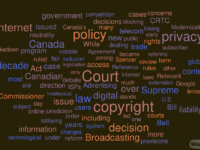As the decade nears an end, there have been no shortage of decade in review pieces. This post adds to the list with my take on the most notable Canadian digital cases, legislative initiatives, and policies of the past ten years.
1. The 2012 Copyright Modernization Act
The enactment of the 2012 Copyright Modernization Act in June 2012 brought more than a decade of copyright reform battles to a close and immediately ushered in a new round of debate and lobbying that continues until this day. The reform package was the largest copyright overhaul in years, featuring everything from an expansion of fair dealing (including education as a fair dealing purpose) to protection for non-commercial user generated content to the codification of the notice-and-notice system to legal protection for digital locks. The reforms also legalized longstanding practices such as time shifting, set a cap on liability for non-commercial infringement, and established a new provision to target websites that enable infringement.











